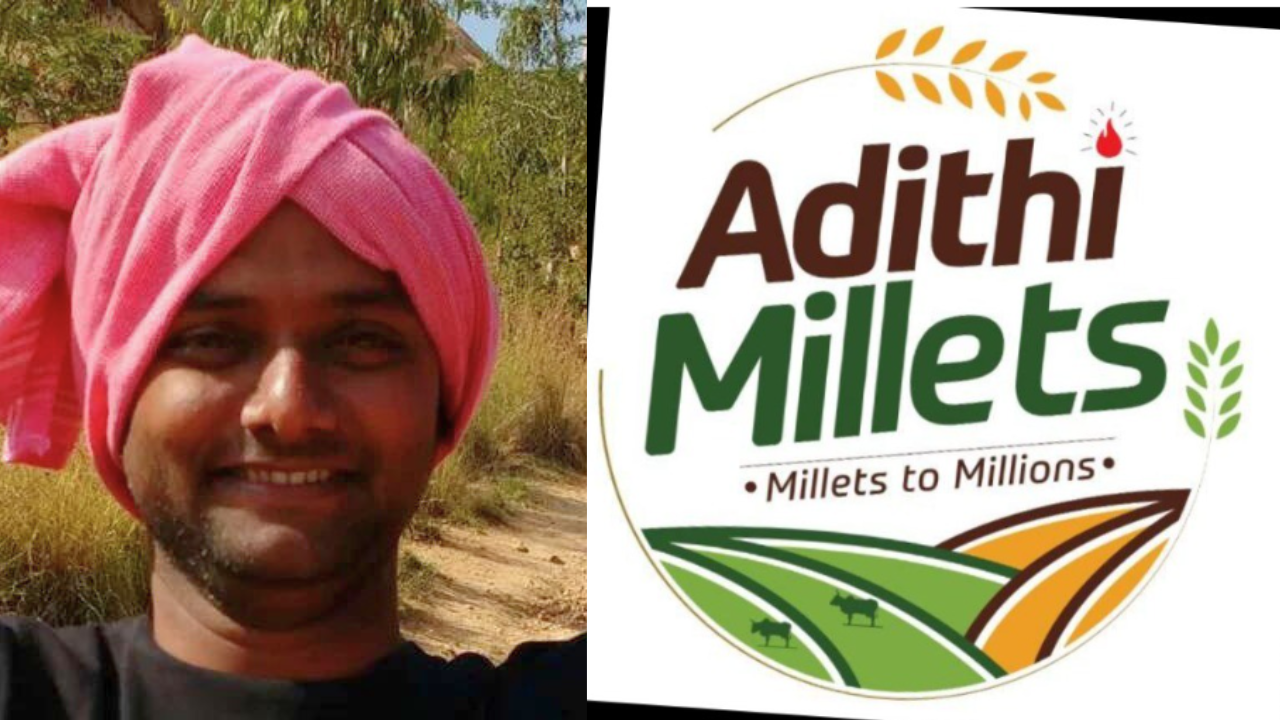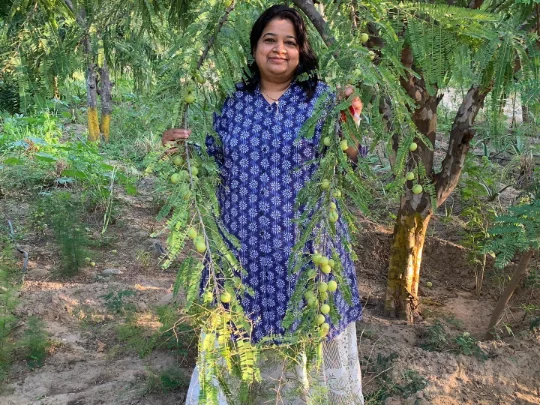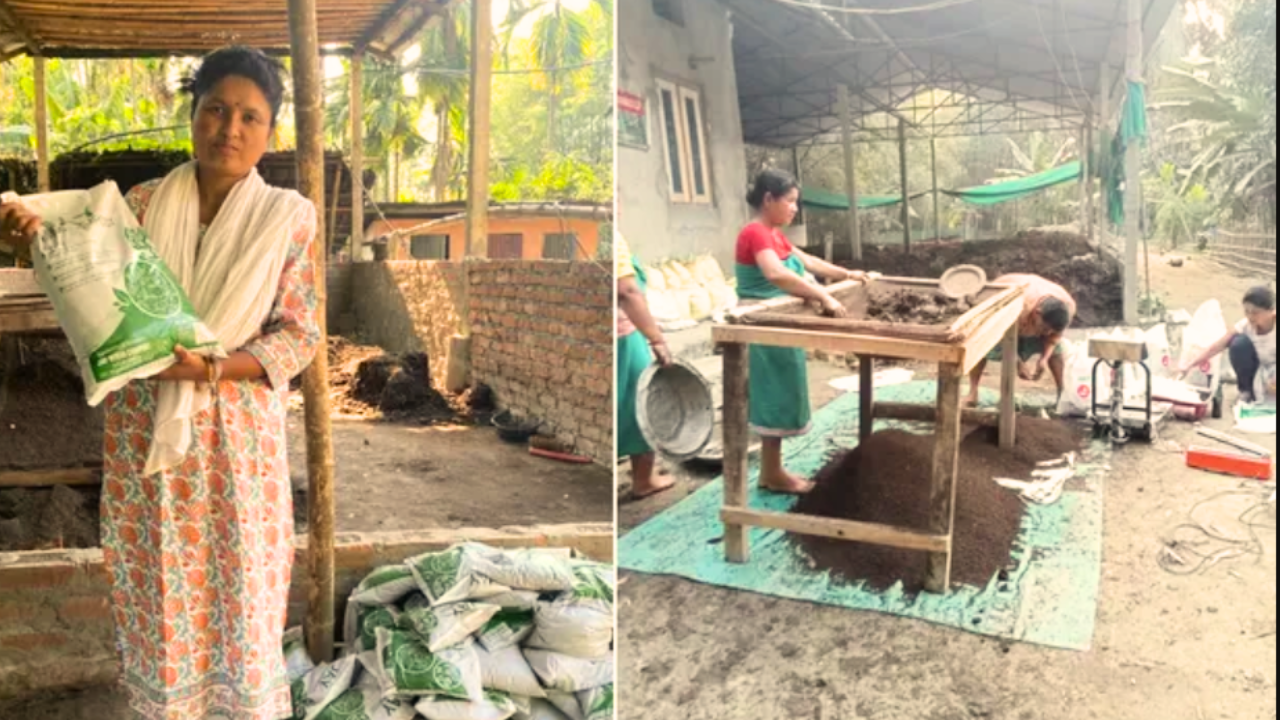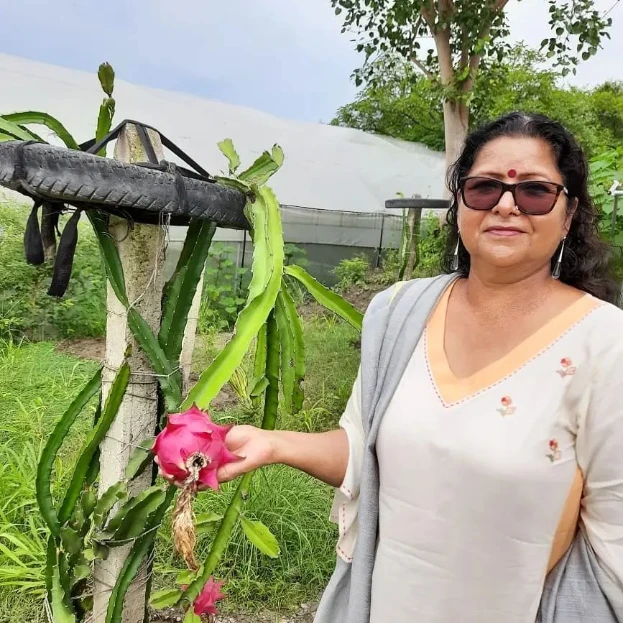Imagine a peaceful farm scene: native seeds being carefully sown by farmers, strong bulls plowing the earth in open fields, content cows grazing on pure, untouched grasslands, and rural women crafting ghee (clarified butter) over a gentle wooden fire. And all of this without the rush and noise of city life.
This picturesque setting is what you’ll find on Amith Kishan’s farm in Andhra Pradesh.
Feeling concerned about the growing presence of chemical-laden foods, Amith, a 33-year-old who used to work in the banking sector in Bengaluru, decided to leave his corporate job. His goal was to embrace traditional farming methods and transform the way food is cultivated, harvested, and enjoyed.
Amith operates Hebbevu Farms with the purpose of offering customers organic and freshly grown vegetables, pulses, and dairy products. At the heart of his approach is sustainability. He has adopted environmentally friendly practices and moved away from using plastics, chemicals, and tractors, opting instead for time-tested farming techniques.
According to Amith, “Farming should be sustainable. Over the past four years, we’ve embraced zero budget farming and found success with it. Our approach involves cultivating everything naturally, avoiding chemical fertilizers to safeguard the soil’s health in the long run.”
He elaborates, “We utilize traditional methods like desi cow dung and cow urine, and we enlist bulls for plowing while producing wood-pressed oil. We sow indigenous seeds and cultivate only what Mother Earth naturally provides. The distinctiveness of our farm lies in practicing native farming methods.”
Amith cultivates around 40 different varieties of grains and vegetables, ranging from indigenous brinjals and groundnuts to unique gangabhavani coconuts, white chickpeas, and pulses such as toor, moong, and urad. In addition to dairy products and vegetable oils, he sells up to six tonnes of vegetables and 1,500 liters of milk daily. His efforts have reached over 3 lakh (300,000) customers, serving around 1,800 customers daily through his store in Bengaluru and his website.
Transitioning from banks to farms
Over the course of eight years, Amith worked with various banks like ICICI, Bajaj, Axis, HDFC, and Punjab National Bank (PNB), managing top corporate clients in Bengaluru. However, he always felt a strong pull towards his roots and a desire to become a farmer, just like his grandfather.
“My grandfather held a notable reputation as a farmer in the vicinity. When I was a child, we used to visit the farm and play in the soil while he worked in the fields,” he reminisces.
The decision to leave his corporate career and follow in his grandfather’s footsteps was prompted by a personal loss. Amith lost a client to cancer. “I had a client who was insured with me. Sadly, he passed away from cancer within a year and a half. I handled all the insurance claims for his family. Witnessing this made me realize the need to reassess our lifestyle and food choices, as the quality of our food seemed inadequate. I felt the urge to make a positive change. Everything was pushing me towards a different path,” he explains.
In 2016, Amith took the bold step of quitting his job to pursue farming. Reflecting on the initial months, he shares, “At first, we were unsure about what to plant and when. While neighboring farmers grew chillies, we planted groundnuts. We were unfamiliar with the different agricultural seasons,” he admits.
After investing three years into research and development, he teamed up with his brother Ashrith to establish Hebbevu Farms in 2019. “We began from scratch, seeking guidance from numerous organic farmers to grasp the intricate details of farming,” he adds.
However, adopting natural farming methods presented its own set of challenges. “All the farmers around us were using chemicals to cultivate crops. When I started growing crops without chemicals, people called me foolish and ridiculed my approach. They continued using chemicals, which led to pest attacks on my farm. To survive, I tried to educate them about natural and organic farming methods,” he shares.
Amith’s natural farming practices involved deep ploughing up to four feet for better root growth and replacing chemical fertilizers with organic alternatives like cow dung, cow urine, and bananas to enhance soil potassium levels.
“As a result, earthworms returned to our soil, which had become rare due to chemical use in farming. However, the true transformation occurred when we introduced native animals to our farm,” he notes.
At the moment, his farm accommodates a population of 700 native cows and buffaloes, encompassing breeds like Gir, Sahiwal, and Jafarabadi. “These animals help us with natural farming, dairy product sales, biogas production, and farm tourism,” he adds. In addition to this, he relies on solar power, significantly reducing his monthly electricity costs from $3500 to $500.
Starting with a loan of $180,000 and a 15-acre piece of land, Amith now generates an annual revenue of $2.5 million from his expansive 650-acre farm.
Employment opportunities generated
Amith doesn’t work alone; he has a team of 120 people supporting him, including a group of rural women. He’s been able to provide jobs to over 3,000 women from 18 nearby villages like Chinnamanthur, Mavutur, Peddamanthuru, Roddam, and Madakasira.
“We give each woman 25 liters of milk daily, which they use to make products like ghee and paneer. For every kilogram of our special A2 desi cow Bilona ghee that’s produced, it directly creates a job opportunity for a woman in the village,” he explains.
One of these women is Govindamma from Mavaturu village. She’s been working with Amith for three years now. Earlier, as a widow and mother of one, she struggled as a daily laborer. “I could only find work for about 12 days each month, earning around Rs 200-300 per day. After my husband passed away, I had to take on the entire financial burden,” shares the 48-year-old.
But things have changed for the better. Govindamma now earns a consistent monthly income of up to Rs 15,000 as a proud salaried worker. “With this money, I’ve managed to build a home for my family of four,” she proudly states.
While many rural women are feeling empowered, Amith is certain that becoming a farmer was the right decision for him. He contrasts his previous life in Bengaluru, where he used to leave for work early and return late, enduring pollution and relying on fast food. “Here, I lead a calm and slow-paced life. I get to spend quality time with my family and enjoy the fruits from our trees whenever we want,” he reflects.
He adds, “In the city, I used to exhaust myself for others. Now, I’m working for myself and my village.”







